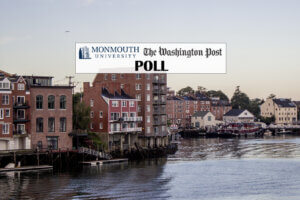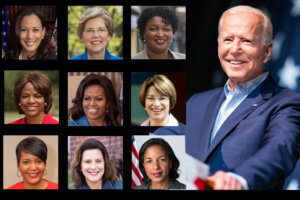West Long Branch, NJ – Massachusetts Sen. Elizabeth Warren has joined former Vice President Joe Biden at the front of the pack in New Hampshire, according to the latest Monmouth University Poll. She has taken support from both Biden and Vermont Sen. Bernie Sanders since Monmouth’s first poll of the state’s Democratic contest this past spring. The poll also finds that most primary voters say they prioritize electability over issue alignment, but seem to feel they are not actually forced to make that choice when it comes down to it.
Among registered New Hampshire Democrats and unaffiliated voters who are likely to participate in the February 2020 Democratic primary, 27% currently support Warren and 25% support Biden. The only other candidates in double digits are Sanders at 12% and South Bend Mayor Pete Buttigieg at 10%. Others with measurable support are California Sen. Kamala Harris (3%), New Jersey Sen. Cory Booker (2%), Hawaii Rep. Tulsi Gabbard (2%), Minnesota Sen. Amy Klobuchar (2%), former hedge fund manager Tom Steyer (2%), and entrepreneur Andrew Yang (2%). The remaining 10 candidates included in the poll earn 1% or less.
Compared to Monmouth’s prior New Hampshire poll, which was in May, Warren’s support has grown by 19 points (from 8%) while Biden’s has dropped by 11 points (from 36%). Other candidates who have slipped somewhat are Sanders (down 6 from 18%) and Harris (down 3 from 6%). Buttigieg’s support is about the same as it was four months ago (up one from 9%).
“Warren continues to look stronger with every new poll. She seems to be picking up support across the spectrum with gains coming at the expense of both Biden and Sanders,” said Patrick Murray, director of the independent Monmouth University Polling Institute.
Warren has improved her standing among self-described liberals by 28 points since May (now at 39%), while Sanders has dropped by 13 points (16% now) and Biden has dropped by 7 points (16% now). Warren has also increased her share among moderates and conservatives by 11 points (now at 18%), while Biden has declined by 15 points (30% now) and Sanders is off by just one point (9% now).
It is important to keep in mind that the race is still very much in flux. Monmouth analysts ran a variety of different likely voter models in addition to the benchmark reported in this release. A model that increases the share of lower propensity voters shows Biden with 27% support, Warren with 25%, Sanders with 14% and Buttigieg with 9%. A model that gives more weight to traditional primary voters shows Warren with 29% support, Biden with 24%, Buttigieg with 11%, and Sanders with 10%.
Most New Hampshire Democratic primary voters (61%) say if they had to choose they would select a candidate who they don’t agree with on most issues but would be stronger against President Donald Trump in the general election. On the other hand, 27% say if they had to choose they would support a candidate they agree with on the issues even if that person would have a hard time beating Trump. These results are in line with Monmouth’s prior poll (68% stronger candidate versus 25% candidate agree with on issues).
“I’ve traveled throughout New Hampshire and Iowa talking to voters who say they prioritize electability. I started to suspect they weren’t defining that term the same as pundits and decided to ask some follow-up questions. These results suggest that many voters believe they have found a candidate who is the holy grail of issue alignment and electability, so they aren’t forced to make a calculated decision between the two factors,” said Murray.
Overall, 69% of likely voters say the candidate they back right now is the one they agree with the most on the issues. Just 10% say they tend to agree with another candidate more than the one they are currently backing. By comparison, 52% feel they are backing the most electable Democrat, while 18% say that another candidate in the field would actually be stronger against Trump. Interestingly, these results are almost identical among those who actually claim that they would prioritize electability over issues if they had to choose. Among voters who say they would back the stronger candidate against Trump, 55% report that their current choice is indeed the strongest candidate, but another 18% say they are backing someone they feel is not necessarily the strongest general election candidate.
“We’ve seen a higher preference for so-called ‘electability’ in the polls this year, but it’s not clear that Democratic voters are really willing to make that choice when the rubber hits the road. Some voters do not appear to be the best judges of their own willingness to prioritize electability over issue alignment,” said Murray.
About half of all likely voters (47%) say their current candidate choice is the one they agree with the most and who also has the best chance against Trump. Among this group of voters, 35% back Biden and 34% back Warren, while another 15% support Sanders and 5% support Buttigieg.
The Monmouth University Poll also asked voters to rate 12 candidates who are likely to take the debate stage next month. Warren holds the most positive rating at net +55 points (74% favorable and 19% unfavorable), which is up from her +39 rating in May (63%-24%). Biden now holds a net +42 rating (66%-24%), down from +65 in May (80%-15%). Sanders gets a +35 rating (63%-28%), which is down from +54 (73%-19%). Buttigieg earns a +50 rating (62%-12%), which is similar to his +47 net rating in May (54%-7%).
“Buttigieg could be the stalking horse here. His star seemed to dim a bit over the summer, but these poll results suggest he could have some strength in New Hampshire,” said Murray.
Other candidate ratings include Harris at +31 (54% favorable and 23% unfavorable), Booker at +31 (49%-18%), Klobuchar at +22 (41%-19%), and former Texas Rep. Beto O’Rourke at +14 (40%-26%). These candidates have seen their net ratings drop by 11 to 19 points since May. The rest of the field includes Gabbard holding a steady +10 net rating (32%-22%) with higher name recognition, newcomer Steyer clocking in at +10 (32%-22%), and Yang improving to a +5 rating (31%-26%) with significantly higher name recognition since May. Former cabinet secretary Julián Castro has seen his net rating drop to a net negative -7 points (26%-33%), compared to a positive +17 rating in May (30%-13%).
On the issue of health care, 10% of New Hampshire Democrats say this is the single most important concern for them in choosing a Democratic candidate to support. Another 68% say it is one of several very important issues in their primary vote, 17% say it is just somewhat important, and 4% say it is not important. When asked about their preferred approach to health insurance reform, a majority (56%) would like to have a public option in addition to private insurance, 23% want to replace private insurance with a single public plan like “Medicare for All,” 10% would like to see any reforms limited to better regulation of costs, and 8% prefer no changes to the current system. Among voters who want a single payer plan, 40% back Warren, 24% back Sanders, 17% back Biden, and 2% back Buttigieg. Among those who prefer a public option, 27% back Biden, 25% back Warren, 14% back Buttigieg, and 7% back Sanders.
The poll also finds that 22% of likely Democratic primary voters report having seen at least one of the presidential candidates in person this year. The most frequent sightings are Warren (10%), Buttigieg (9%), Sanders (8%), and Biden (7%). Other contenders who have been spotted in the Granite State include Klobuchar (6%), O’Rourke (5%), Booker (5%), Harris (4%), Yang (4%), Castro (3%), Gabbard (3%), Steyer (3%), and Marianne Williamson (3%).
The Monmouth University Poll was conducted by telephone from September 17 to 21, 2019 with 401 New Hampshire voters who are likely to vote in the Democratic presidential primary in February 2020, out of 664 registered voters that were contacted for the poll. The question results in this release have a margin of error of +/- 4.9 percentage points. The poll was conducted by the Monmouth University Polling Institute in West Long Branch, NJ.
QUESTIONS AND RESULTS
(* Some columns may not add to 100% due to rounding.)
1. If the Democratic primary election for president was today, would you vote for [NAMES WERE ROTATED]? [If UNDECIDED: If you had to vote for one of these candidates at this moment, who do you lean toward?]
| TREND: (with leaners) |
Sept. 2019 |
May 2019 |
| Elizabeth Warren | 27% | 8% |
| Joe Biden | 25% | 36% |
| Bernie Sanders | 12% | 18% |
| Pete Buttigieg | 10% | 9% |
| Kamala Harris | 3% | 6% |
| Cory Booker | 2% | 2% |
| Tulsi Gabbard | 2% | <1% |
| Amy Klobuchar | 2% | 2% |
| Tom Steyer | 2% | n/a |
| Andrew Yang | 2% | 1% |
| Beto O’Rourke | 1% | 2% |
| Marianne Williamson | 1% | <1% |
| Julián Castro | <1% | 0% |
| John Delaney | <1% | <1% |
| Tim Ryan | <1% | 1% |
| Michael Bennet | 0% | 0% |
| Steve Bullock | 0% | <1% |
| Bill de Blasio* | 0% | 0% |
| Wayne Messam | 0% | 0% |
| Joe Sestak | 0% | n/a |
| (VOL) Other | 0% | 2% |
| (VOL) No one | 1% | <1% |
| (VOL) Undecided | 9% | 11% |
| (n) | (401) | (376) |
* The poll was being conducted when de Blasio dropped out of the race.
2. Which type of candidate would you prefer if you had to make a choice between: a Democrat you agree with on most issues but would have a hard time beating Donald Trump or a Democrat you do NOT agree with on most issues but would be a stronger candidate against Donald Trump? [CHOICES WERE ROTATED]
| TREND: |
Sept. 2019 |
May 2019 |
| Agrees with but hard time beating Trump | 27% | 25% |
| Do not agree with but stronger against Trump | 61% | 68% |
| (VOL) Rejects choice / no need to pick between two | 6% | 3% |
| (VOL) Don’t know | 6% | 4% |
| (n) | (401) | (376) |
[QUESTIONS 3 & 4 WERE ROTATED]
3. When you think about the policy issues that are important to you, is the candidate you support now the one you tend to agree with the most on these issues, or is there another candidate running who you actually agree with more on these issues?
|
Sept. 2019 | |
| My candidate is who I agree with the most | 69% |
| Another candidate who I agree with more | 10% |
| (VOL) Other candidate agree with equally | 4% |
| (VOL) Don’t know | 7% |
| No candidate choice in Q1 | 10% |
| (n) | (401) |
4. When you think only about electability rather than the issues, is the candidate you support now the one you think has the best chance of beating Donald Trump in 2020, or is there another candidate running who you think would actually have a better chance of beating Trump?
|
Sept. 2019 | |
| My candidate has best chance | 52% |
| Another candidate has best chance | 18% |
| (VOL) Other candidate has equal chance | 4% |
| (VOL) Don’t know | 16% |
| No candidate choice in Q1 | 10% |
| (n) | (401) |
5. I’m going to read you the names of some people who are running for president in 2020. Please tell me if your general impression of each is favorable or unfavorable, or if you don’t really have an opinion. If you have not heard of the person, just let me know. [NAMES WERE ROTATED]
| TREND: | Favorable | Unfavorable | No opinion | Not heard of | (n) |
| Former Vice President Joe Biden | 66% | 24% | 10% | 0% | (401) |
| — May 2019 | 80% | 15% | 5% | 0% | (376) |
| Vermont Senator Bernie Sanders | 63% | 28% | 8% | 1% | (401) |
| — May 2019 | 73% | 19% | 8% | 0% | (376) |
| Massachusetts Senator Elizabeth Warren | 74% | 19% | 6% | 1% | (401)) |
| — May 2019 | 63% | 24% | 11% | 2% | (376) |
| Former Texas Congressman Beto O’Rourke | 40% | 26% | 28% | 6% | (401) |
| — May 2019 | 45% | 16% | 24% | 15% | (376) |
| California Senator Kamala Harris | 54% | 23% | 21% | 3% | (401) |
| — May 2019 | 60% | 10% | 15% | 14% | (376) |
| Minnesota Senator Amy Klobuchar | 41% | 19% | 29% | 11% | (401) |
| — May 2019 | 44% | 11% | 25% | 20% | (376) |
| South Bend, Indiana Mayor Pete Buttigieg | 62% | 12% | 18% | 8% | (401) |
| — May 2019 | 54% | 7% | 19% | 21% | (376) |
| New Jersey Senator Cory Booker | 49% | 18% | 27% | 6% | (401) |
| — May 2019 | 54% | 12% | 22% | 13% | (376) |
| Former cabinet secretary Julián Castro | 26% | 33% | 34% | 7% | (401) |
| — May 2019 | 30% | 13% | 36% | 21% | (376) |
| Entrepreneur Andrew Yang | 31% | 26% | 30% | 13% | (401) |
| — May 2019 | 11% | 14% | 30% | 45% | (376) |
| Former hedge fund manager Tom Steyer | 32% | 22% | 33% | 13% | (401) |
| — May 2019 | — | — | — | — | — |
| Hawaii Congresswoman Tulsi Gabbard | 32% | 22% | 35% | 11% | (401) |
| — May 2019 | 23% | 13% | 31% | 33% | (376) |
6. How important to you is the issue of health care in deciding who to support for the Democratic nomination – is it the single most important issue, one of several very important issues, a somewhat important issue, or not important to you?
|
Sept. 2019 | |
| Most important | 10% |
| Very important | 68% |
| Somewhat important | 17% |
| Not important | 4% |
| (VOL) Don’t know | 1% |
| (n) | (401) |
7. Which of the following comes closest to how you would like to see health care handled: A. get rid of all private insurance coverage in favor of having everyone on a single public plan like Medicare for All, B. allow people to either opt into Medicare or keep their private coverage, C. keep health insurance private for people under age 65 but regulate the costs, or D. keep the health insurance system basically as it is?
| Sept. 2019 | |
| A. Get rid of all private insurance coverage in favor of … Medicare for All | 23% |
| B. Allow people to either opt into Medicare or keep their private coverage | 56% |
| C. Keep health insurance private for people under age 65 but regulate the costs | 10% |
| D. Keep the health insurance system basically as it is | 8% |
| (VOL) Other | 1% |
| (VOL) Don’t know | 2% |
| (n) | (401) |
7A. [If “B. ALLOW PEOPLE TO OPT INTO MEDICARE OR KEEP THEIR PRIVATE COVERAGE” in Q7, ASK:] Would you eventually like to see the nation’s health care coverage move to a universal public system like Medicare for All or do you think there should always be a choice to keep your private coverage? [Percentages are based on the total sample of Democrats.]
| Sept. 2019 | |
| Medicare for All now (from Q7) | 23% |
| Public option: Eventually move to a universal public system like Medicare for All | 19% |
| Public option: Should always be a choice to keep your private coverage | 35% |
| Public option: Don’t know what should happen | 2% |
| Minor, none, other changes to health insurance (from Q7) | 19% |
| (VOL) Don’t know (from Q7) | 2% |
| (n) | (401) |
8. Have you seen any of the Democratic candidates for president in person this year, or not?
|
Sept. 2019 | |
| Yes | 22% |
| No | 78% |
| (n) | (401) |
METHODOLOGY
The Monmouth University Poll was sponsored and conducted by the Monmouth University Polling Institute from September 17 to 21, 2019 with a statewide random sample of 664 New Hampshire voters drawn from a list of registered voters who participated in a primary or general election in the past two election cycles. This includes 345 contacted by a live interviewer on a landline telephone and 319 contacted by a live interviewer on a cell phone, in English. Results are based on 401 voters who are likely to vote in the Democratic presidential primary in February 2020. Monmouth is responsible for all aspects of the survey design, data weighting and analysis. Final sample is weighted for party registration, age, gender, race, and education based on state voter registration list information and U.S. Census information. Data collection support provided by Braun Research (field) and Aristotle (voter sample). For results based on the sample of 401 likely Democratic primary voters, one can say with 95% confidence that the error attributable to sampling has a maximum margin of plus or minus 4.9 percentage points (unadjusted for sample design). Sampling error can be larger for sub-groups (see table below). In addition to sampling error, one should bear in mind that question wording and practical difficulties in conducting surveys can introduce error or bias into the findings of opinion polls.
| DEMOGRAPHICS (weighted) |
| Party Registration |
| 57% Democrat |
| 43% None |
| Self-Reported Party |
| 52% Democrat |
| 48% Other, independent |
| 44% Male |
| 56% Female |
| 12% 18-34 |
| 18% 35-49 |
| 35% 50-64 |
| 35% 65+ |
| 95% White, non-Hispanic |
| 5% Other race, Hispanic |
| 44% No degree |
| 56% 4 year degree |
Click on pdf file link below for full methodology and crosstabs by key demographic groups.




